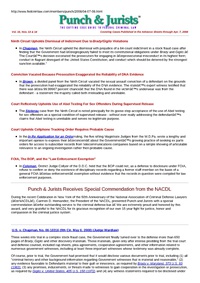Loaded on
Sept. 20, 2010
published in Punch and Jurists
April 07, 2008
Here the Third Circuit became the first Cicruit court to hold that cell phone location data searches may trigger Fourth Amendment concerns and that prosecutors seeking access to such records may be required to show probable cause.
This is an important decision in which the Third Circuit became …
In this case, Judge Collyer rejected an attempt by the Bureau of Prisons (BOP) to create a new “embarrassment” exemption under the Freedom of Information Act (FOIA), 5 U.S.C. § 552.
Monroe Coleman, a BOP inmate, filed a FOIA request for information about a former BOP employee, one Kimberly …
Here the judges wrote to express their “concern” about the Government’s growing practice of seeking ex parte orders for access to subscriber records from telecoms based on relevance to an ongoing investigation rather then probable cause.
In the words of the Court, this decision that was written “to …
Sentences imposed under provisions for enhanced punishment of repeat offenders, based on convictions on substantive and conspiracy counts charging trafficking in cocaine and cocaine base, are remanded for clarification as to two defendants and for clerical correction of the judgments.
[Editor's Note: For a more detailed analysis of this …
Here a divided panel from the Ninth Circuit vacated the sexual assault conviction of a defendant on the grounds that the prosecution had exaggerated the reliability of the DNA evidence by estimating its probability of accuracy.
This is a case that shows the wisdom of sometimes challenging even …
The defendant in this case, Joseph Stoterau, pled guilty to transporting child pornography in violation of 18 U.S.C. § 2252A(a)(1). After he was sentenced to 151 months in prison and a five-year term of supervised release, Stoterau appealed, challenging a number of different aspects of his sentence, including challenges …
Here the Court upheld the dismissal with prejudice of a 64-count indictment in a stock fraud case after finding that the Government had "egregiously failed to meet its constitutional obligations under Brady and Giglio”.
Three weeks into trial in a complex stock-fraud case, the Government finally turned over …
